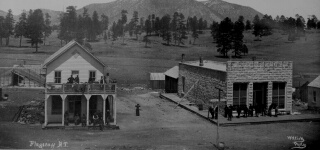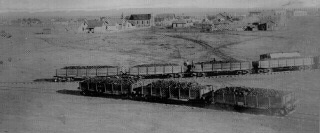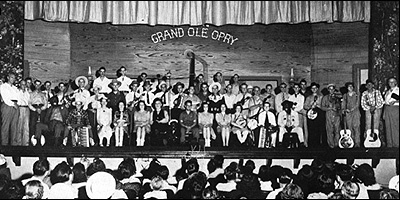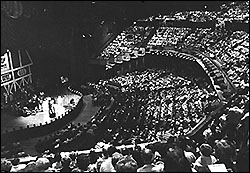
The Towns They Come
As more moved west they came
together to form communities and provide the "necessities" they had left
behind.
The development of the towns was inevitable, man
cannot live alone for too long. Besides to attract the one thing
missing in the "Old West" men had to lure the ladies with something besides
hard work and raising kids. So they built.
 Slowly at first, just a few necessary buildings, the General Store, to
provide the staples for everday life, sugar, flour, salt, etc., the Livery
Stable, to provide the care for the animals, the Jail, to provide security
for the town, and the Saloon to provide what the men really needed--No
No.
Slowly at first, just a few necessary buildings, the General Store, to
provide the staples for everday life, sugar, flour, salt, etc., the Livery
Stable, to provide the care for the animals, the Jail, to provide security
for the town, and the Saloon to provide what the men really needed--No
No.
Despite all they tried the women didn't come flocking to the towns.
So the men had a meeting and decided bigger was better.
 They built them and the women came, bringing changes with them. The
men were so glad to have women around that they caved in on issues of security
(more law enforcement), propriety (fewer bars and no bordellos), and more
class (here comes the Opera House). Of course churches, schools,
and Dry Goods Stores popped up like ticks on an old hound. Yep the days
of carefree days and homemade music were going away. NOT
They built them and the women came, bringing changes with them. The
men were so glad to have women around that they caved in on issues of security
(more law enforcement), propriety (fewer bars and no bordellos), and more
class (here comes the Opera House). Of course churches, schools,
and Dry Goods Stores popped up like ticks on an old hound. Yep the days
of carefree days and homemade music were going away. NOT
Along with the towns came more people who knew music and wrote tunes
reflecting the lifestyles of the moment. The Railroad Corral, talks
of herding cattle to town to sell at the Railroad Corral. Bury Me
Not on the Lone Prairie, talks of a cowboys wish not to be forgotten and
his dream of being buried in church cemetary, The Old Chisum
Trail, a song of cattle drives to provide beef for the big cities and the
cowboys resolve to rid himself of this life and be a farmer. The
emphasis on settling down and getting married was replacing the happy singular
life of the drover.
 The tales of war, the indian fights, the heroics of great leaders all made
up the music for the west for many years, then the Modern Age of Country
Music arrived.
WSM and the Opry
The tales of war, the indian fights, the heroics of great leaders all made
up the music for the west for many years, then the Modern Age of Country
Music arrived.
WSM and the Opry
 In 1925 WSM radio began broadcasting a live music show displaying the talents
of "country" people. Originally done in the studio, The Opry outgrew it's
home and in 1934 moved to the Hillsboro Theater where the format was changed
to 15 minute segments paid for by sponsors. At this time the Opry was still
free and tickets were given away by insurance salesmen as a promo.
In 1925 WSM radio began broadcasting a live music show displaying the talents
of "country" people. Originally done in the studio, The Opry outgrew it's
home and in 1934 moved to the Hillsboro Theater where the format was changed
to 15 minute segments paid for by sponsors. At this time the Opry was still
free and tickets were given away by insurance salesmen as a promo.
After a breif stay at the Dixie Tabern the Grand
Ole Opry moved to War memorial Auditorium in 1939 where admission was
charged to keep down the crowds (25 cents a head---it didn't work)
We all know the rest in 1943 the move to the Ryman Auditorium
and in 1974 to the New Opry House. Boy did that radio show change
the face of country music.
When NBC began broadcasting a 30 min show in 1939, Roy
Acuff was the host. His association with the hit show earned
him the title "King of Country Music"
From the Folk Music of the Southern Mountains thru the swing music
of Pee Wee King and Ernest Tubb changed the face of what we heard.
Along with Bill Monroe and his Bluegrass and the introduction of amplified
music with Bob Wills the quiet, homespun flavor of Country & Western
Music was gone.
The Stars of the Opry know that if you made it as a regular on the Opry
you had it made. How well that has been proven over the years.
Hank Williams, Patsy Cline, Porter Wagoner, Dolly Parton, up to LeAnn Rimes
all owe so much to The Opry.

 The "New" Opry House
For more information regarding the Grand Ole Opry check out History
of the Opry
Return to the start
Back to page 2
The "New" Opry House
For more information regarding the Grand Ole Opry check out History
of the Opry
Return to the start
Back to page 2




